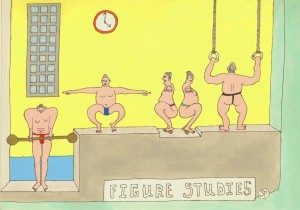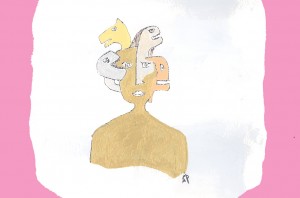That everyone should receive an education is a wonderful democratic ideal, but that everyone should receive the same education is a totalitarian ideal.
Below is a link to the Japanese version of a a keynote presentation I gave on 23 January, 2010, at the invitation of Meisei Gakuen, a highly innovative elementary and junior high school for the deaf, where sign language is fully recognized and developed as the native language of their students and used as a language of instruction. It is a dual language school in Japanese sign language and Japanese literacy, with the classes team-taught by a deaf teacher and a hearing teacher.
http://www.meiseigakuen.ed.jp/deafbilingual2010/keynote/index.html
Now I don’t know what any of these creatures look like, actually: I have a very poor visual memory and I drew them from memory. What I do know, though, is that things look very very different depending on the standpoint of the observer, both literally and figuratively. To paraphrase Proust, the truest journey is not to see 100 places with one pair of eyes, but to see one place with 100 pair of eyes.

I think it is important to see things from different perspectives instead of making assumptions based on only one of them. That said, I have a poor visual memory so thinking or imagining, more than seeing, may be what it is really about. I have no idea why I picked sumo characters to illustrate the point. David Lynch, the artist and film director, believed that ideas or concepts float in the air for anyone to pull down. If one is open and wanting, one may receive them. They may come in fragments, possibly to become consolidated and embodied in a work of art. A weird and wonderful process, I would say, whether or not one is attracted to the product.
When I was a college student I took a summer class on the works of Herman Melville at Johns Hopkins University in Baltimore. I had to write a paper on one of Melville’s works. The title of my essay, which is all I remember of it, was “Double Look + Twice Think = Horror: Melville’s World View as seen in The Confidence Man.” The professor, whose name I don’t remember, had spoken a lot about Moby Dick and the symbolism of the white whale. He reminded us that without light, there is no color. I found it very scary and interesting to imagine things in themselves without a bit of color. It is the reflection of light off of things in themselves that makes things colorful to our eyes. The things in themselves, by themselves, are color free…and so are we….physically.
About Me: Steven Parr
I am a long term resident of Japan, and the Founding Director of New International School of Japan, a dual language and multiage by design international school in Tokyo. It keeps me busy, but also I have ideas and images I would like to share, not all of which are directly related to education; hence, this blog site.






